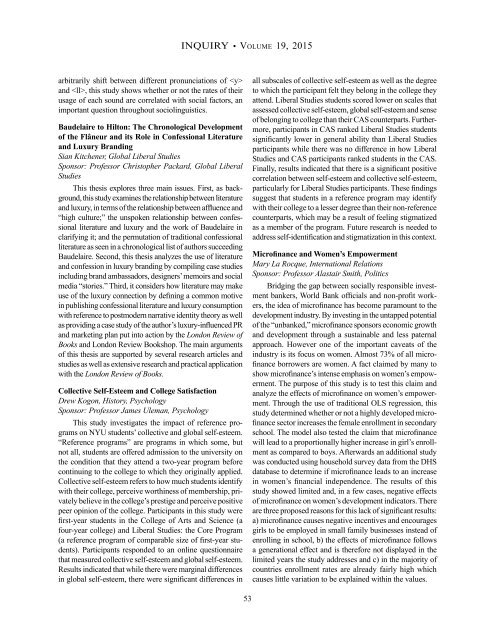INQUIRY
InquiryXIX
InquiryXIX
You also want an ePaper? Increase the reach of your titles
YUMPU automatically turns print PDFs into web optimized ePapers that Google loves.
<strong>INQUIRY</strong> • Volume 19, 2015<br />
arbitrarily shift between different pronunciations of <br />
and , this study shows whether or not the rates of their<br />
usage of each sound are correlated with social factors, an<br />
important question throughout sociolinguistics.<br />
Baudelaire to Hilton: The Chronological Development<br />
of the Flâneur and its Role in Confessional Literature<br />
and Luxury Branding<br />
Sian Kitchener, Global Liberal Studies<br />
Sponsor: Professor Christopher Packard, Global Liberal<br />
Studies<br />
This thesis explores three main issues. First, as background,<br />
this study examines the relationship between literature<br />
and luxury, in terms of the relationship between affluence and<br />
“high culture;” the unspoken relationship between confessional<br />
literature and luxury and the work of Baudelaire in<br />
clarifying it; and the permutation of traditional confessional<br />
literature as seen in a chronological list of authors succeeding<br />
Baudelaire. Second, this thesis analyzes the use of literature<br />
and confession in luxury branding by compiling case studies<br />
including brand ambassadors, designers’ memoirs and social<br />
media “stories.” Third, it considers how literature may make<br />
use of the luxury connection by defining a common motive<br />
in publishing confessional literature and luxury consumption<br />
with reference to postmodern narrative identity theory as well<br />
as providing a case study of the author’s luxury-influenced PR<br />
and marketing plan put into action by the London Review of<br />
Books and London Review Bookshop. The main arguments<br />
of this thesis are supported by several research articles and<br />
studies as well as extensive research and practical application<br />
with the London Review of Books.<br />
Collective Self-Esteem and College Satisfaction<br />
Drew Kogon, History, Psychology<br />
Sponsor: Professor James Uleman, Psychology<br />
This study investigates the impact of reference programs<br />
on NYU students’ collective and global self-esteem.<br />
“Reference programs” are programs in which some, but<br />
not all, students are offered admission to the university on<br />
the condition that they attend a two-year program before<br />
continuing to the college to which they originally applied.<br />
Collective self-esteem refers to how much students identify<br />
with their college, perceive worthiness of membership, privately<br />
believe in the college’s prestige and perceive positive<br />
peer opinion of the college. Participants in this study were<br />
first-year students in the College of Arts and Science (a<br />
four-year college) and Liberal Studies: the Core Program<br />
(a reference program of comparable size of first-year students).<br />
Participants responded to an online questionnaire<br />
that measured collective self-esteem and global self-esteem.<br />
Results indicated that while there were marginal differences<br />
in global self-esteem, there were significant differences in<br />
all subscales of collective self-esteem as well as the degree<br />
to which the participant felt they belong in the college they<br />
attend. Liberal Studies students scored lower on scales that<br />
assessed collective self-esteem, global self-esteem and sense<br />
of belonging to college than their CAS counterparts. Furthermore,<br />
participants in CAS ranked Liberal Studies students<br />
significantly lower in general ability than Liberal Studies<br />
participants while there was no difference in how Liberal<br />
Studies and CAS participants ranked students in the CAS.<br />
Finally, results indicated that there is a significant positive<br />
correlation between self-esteem and collective self-esteem,<br />
particularly for Liberal Studies participants. These findings<br />
suggest that students in a reference program may identify<br />
with their college to a lesser degree than their non-reference<br />
counterparts, which may be a result of feeling stigmatized<br />
as a member of the program. Future research is needed to<br />
address self-identification and stigmatization in this context.<br />
Microfinance and Women’s Empowerment<br />
Mary La Rocque, International Relations<br />
Sponsor: Professor Alastair Smith, Politics<br />
Bridging the gap between socially responsible investment<br />
bankers, World Bank officials and non-profit workers,<br />
the idea of microfinance has become paramount to the<br />
development industry. By investing in the untapped potential<br />
of the “unbanked,” microfinance sponsors economic growth<br />
and development through a sustainable and less paternal<br />
approach. However one of the important caveats of the<br />
industry is its focus on women. Almost 73% of all microfinance<br />
borrowers are women. A fact claimed by many to<br />
show microfinance’s intense emphasis on women’s empowerment.<br />
The purpose of this study is to test this claim and<br />
analyze the effects of microfinance on women’s empowerment.<br />
Through the use of traditional OLS regression, this<br />
study determined whether or not a highly developed microfinance<br />
sector increases the female enrollment in secondary<br />
school. The model also tested the claim that microfinance<br />
will lead to a proportionally higher increase in girl’s enrollment<br />
as compared to boys. Afterwards an additional study<br />
was conducted using household survey data from the DHS<br />
database to determine if microfinance leads to an increase<br />
in women’s financial independence. The results of this<br />
study showed limited and, in a few cases, negative effects<br />
of microfinance on women’s development indicators. There<br />
are three proposed reasons for this lack of significant results:<br />
a) microfinance causes negative incentives and encourages<br />
girls to be employed in small family businesses instead of<br />
enrolling in school, b) the effects of microfinance follows<br />
a generational effect and is therefore not displayed in the<br />
limited years the study addresses and c) in the majority of<br />
countries enrollment rates are already fairly high which<br />
causes little variation to be explained within the values.<br />
53


